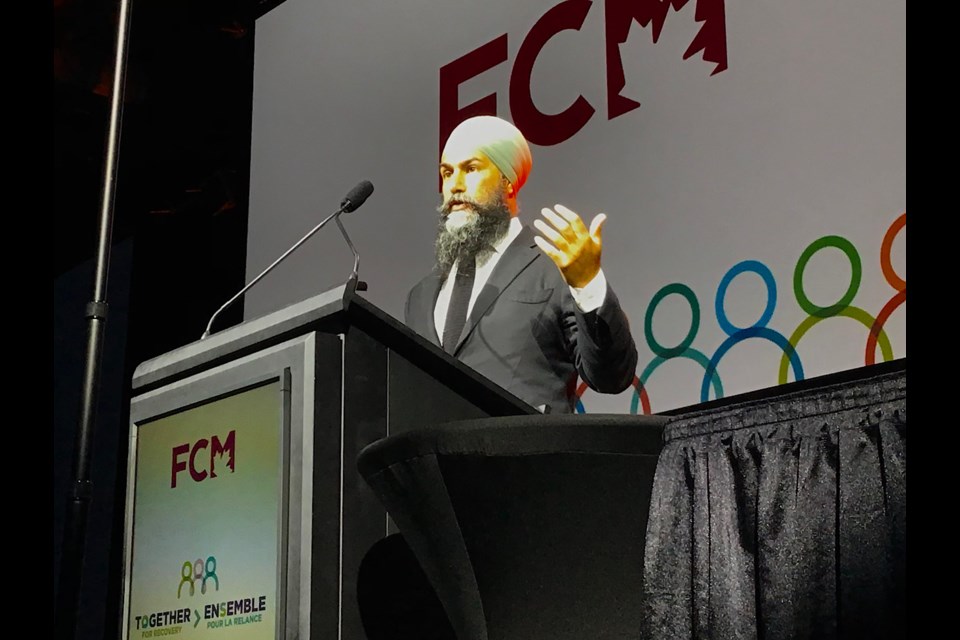REGINA — Inflation and affordability were once again top issues at the Federation of Canadian Municipalities' Annual Conference on Saturday as NDP leader Jagmeet Singh gave his keynote address.
Singh spoke to delegates and also met with the FCM executive during his appearance in Regina. The spike in the cost of living, and in particular as it relates to housing prices, has proven to be the hottest topic of discussion among municipal leaders at FCM all this week.
The impact has been felt across the board, which Singh acknowledged in speaking to reporters.
“What we know right now is that people are hurting,” said Singh. “We’ve seen the cost of everything go up — the cost of groceries, gas, bills people are paying for.”
But Singh pointed out that while this was going on some of the large grocery stores and oil and gas companies were making record profits.
To address the affordability issues on housing, Singh said what they’ve done in their agreement with the Liberals is “secured some pretty big steps to making it more affordable to get a house," such as tackling rich investors who have made massive profits off of housing.
He noted the definition of what was considered affordable has been changed as part of their agreement. Before, in a city like Toronto, $2,200 was considered affordable rent for apartments, and projects would receive public money when 20 per cent of those units meet that definition.
Singh said they had that requirement changed to be $1,000 for a one bedroom and 40 per cent of the project must be at that level to receive funding.
“That was a big game changer,” said Singh. He said it’s going to mean more homes that are affordable to rent.
Singh also pointed to the investment in the Housing Accelerator Fund, which he said would give municipalities the ability to build more affordable homes.
The affordability crunch is also hitting municipalities directly, both with the costs of projects as well as in delivery of services. To alleviate this, Singh said his party has long called for more support from the federal government to municipalities.
“What we need to do is make sure the federal government is stepping up, particularly now when there’s such a crunch. We’ve seen the pandemic have a really big toll on cities and municipalities, we’ve seen the cost of living have an impact, so that means the federal government needs to step up so much more.”
Municipalities also have had to deal with addictions issues with opioids, fentanyl, crystal meth and other drugs. Singh said he preferred a decriminalization approach, saying the criminal-based approach doesn’t actually work.
“We put forward a bill just recently, last week, in parliament for a vote saying let’s stop taking the criminal approach, and let’s take a health care approach to saving lives, because we know we can save these lives.”
The Liberals had voted against that bill but did provide an exemption to allow it in British Columbia. Singh was happy to see it applied to B.C. but said it wasn’t enough. “It should be applied across Canada,” Singh said.
Singh was not the only federal politician to address FCM this week. Delegates heard a virtual address from Prime Minister Justin Trudeau Friday as well as in person from former Conservative leader Andrew Scheer, who represents Regina-Qu'Appelle.
Also attending this week have been federal ministers including Dominic LeBlanc and Marco Mendicino, who held meetings during the four-day conference, which wraps up Sunday.
Scott Pearce, mayor of township of Gore, Que., who as of this Sunday is first vice-president of FCM, said he was happy with the interest from all of the political parties. But he emphasized the need for them to come forward with “concrete action.”
“Words are nice and we appreciate the respect we’re getting, but we want to see that actual solid work, and really working in partnership.”
He noted that even in his own rural region, costs of housing have skyrocketed. Before COVID-19, an apartment would rent for $700. Now it’s $1,700. He also noted a small bungalow that was listed for $169,000 recently sold for $350,000.
“Young folks just recently married or looking to start a family, it’s almost impossible,” said Pearce. He said he wanted to ramp up getting more housing built and wanted to see the federal government put some programs together to make it easier.
He also acknowledged that for municipalities, they were facing mounting costs for diesel for their municipal equipment to clear the roads. He also noted they have raised the issue of costs incurred from the recent RCMP collective bargaining, with some municipalities “looking at millions of dollars that they didn’t have a chance to budget for.”
Pearce also acknowledged that projects are costing more. He was hearing a lot of stories of projects that had been built or received funding, but due to the cost of living, “that project is going to cost 15 to 20 per cent more.” Pearce did not want to see those worthwhile projects lost due to cost of living issues.
“The object now is to make sure the government will come to the table and share some of those increased costs,” said Pearce.




